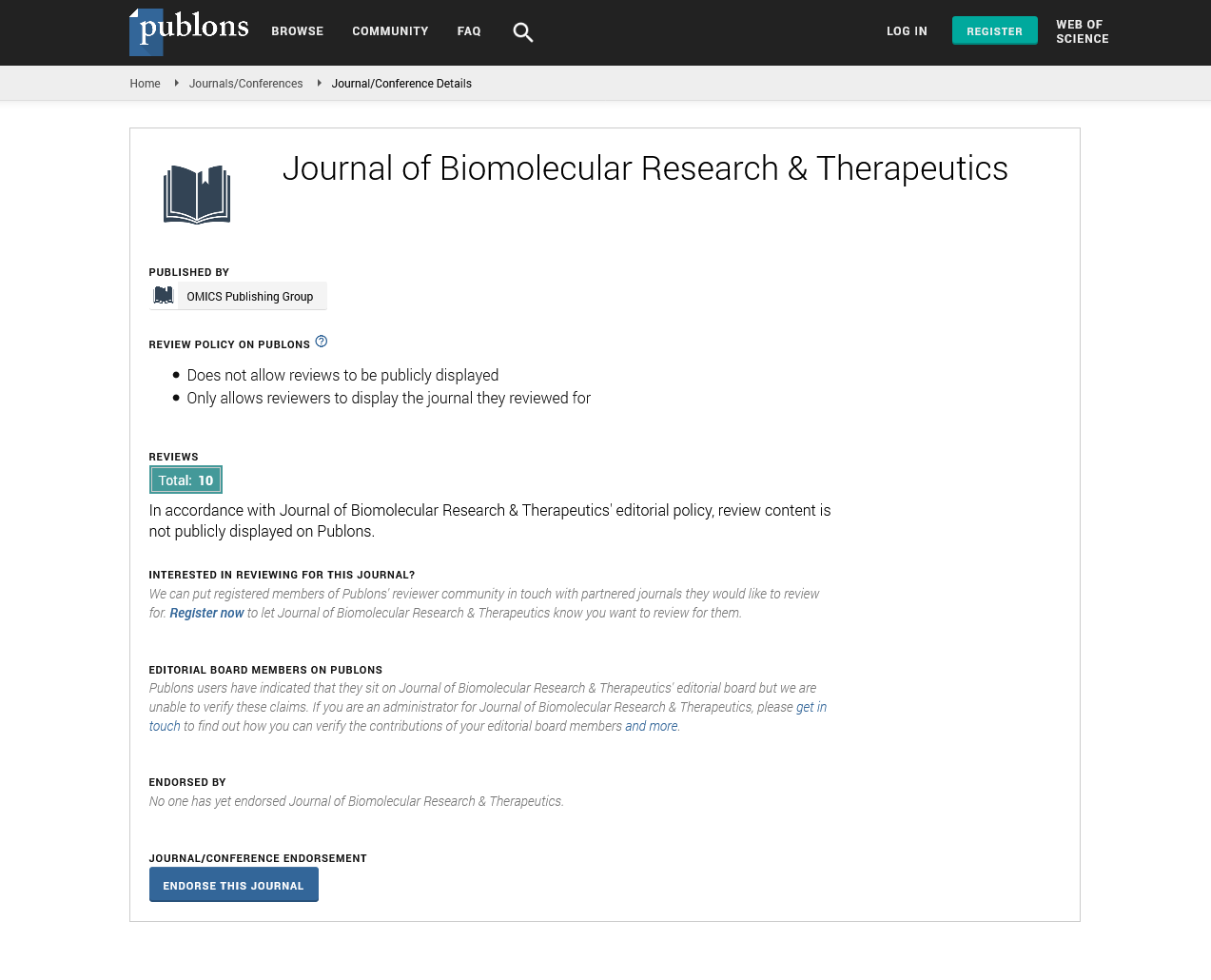Indexed In
- Open J Gate
- Genamics JournalSeek
- ResearchBible
- Electronic Journals Library
- RefSeek
- Hamdard University
- EBSCO A-Z
- OCLC- WorldCat
- SWB online catalog
- Virtual Library of Biology (vifabio)
- Publons
- Euro Pub
- Google Scholar
Useful Links
Share This Page
Journal Flyer

Open Access Journals
- Agri and Aquaculture
- Biochemistry
- Bioinformatics & Systems Biology
- Business & Management
- Chemistry
- Clinical Sciences
- Engineering
- Food & Nutrition
- General Science
- Genetics & Molecular Biology
- Immunology & Microbiology
- Medical Sciences
- Neuroscience & Psychology
- Nursing & Health Care
- Pharmaceutical Sciences
Opinion Article - (2023) Volume 12, Issue 12
Biomolecular Therapeutics and the Modified Treatment Revolution
Rajiv Martyn*Received: 06-Nov-2023, Manuscript No. BOM-23-24330; Editor assigned: 08-Nov-2023, Pre QC No. BOM-23-24330(PQ); Reviewed: 30-Nov-2023, QC No. BOM-23-24330; Revised: 07-Dec-2023, Manuscript No. BOM-23-24330(R); Published: 14-Dec-2023, DOI: 10.35248/2167-7956.23.12.355
Description
In recent years, the landscape of medicine has been rapidly evolving with the emergence of biomolecular therapeutics. These innovative treatments has the more power of biological molecules, such as proteins, antibodies, and nucleic acids, to target and treat various diseases at the molecular level. As this field continues to advance, numerous companies have emerged as leaders in biomolecular therapeutics, driving innovation and revolutionizing the way we approach healthcare. Biomolecular therapeutics represent a paradigm shift in medicine, moving away from traditional small-molecule drugs towards highly targeted and personalized treatments. This therapeutics leverage the intrinsic biological processes of the human body, present the potential for enhanced efficacy and reduced side effects compared to conventional drugs.
Types of biomolecular therapeutics:
monoclonal Antibodies (mAbs) :Companies like Genentech, Amgen, and Regeneron have been at the lead of developing monoclonal antibodies, which are engineered proteins that mimic the immune system's ability to fight harmful pathogens. mAbs have shown remarkable success in treating various cancers, autoimmune diseases, and infectious diseases.
Gene therapies: Pioneering companies like CRISPR Therapeutics, Editas Medicine, and bluebird bio are focused on gene therapies, which involve the introduction, deletion, or correction of genetic material to treat or prevent diseases. This revolutionary approach holds promise for rare genetic disorders, including muscular dystrophy and certain types of blindness.
Rna therapeutics: Moderna and BioNTech are leading the way in RNA therapeutics, particularly mRNA-based vaccines. These therapies utilize messenger RNA to instruct cells to produce specific proteins, triggering an immune response against diseases such as COVID-19. RNA therapeutics also shows potential in treating genetic disorders and various cancers.
Biomolecular therapeutics in industry
Genentech, a subsidiary of Roche, has been a pioneer in the field of biomolecular therapeutics since its founding in 1976. The company's collection includes revolutionary monoclonal antibody therapies such as Rituxan, Herceptin, and Avastin, which have transformed the treatment landscape for cancer and autoimmune diseases. Amgen is a biotechnology giant known for its contributions to the development of biopharmaceuticals. The company's focus on innovative therapeutics, including monoclonal antibodies like Enbrel and Neulasta, has positioned it as a leader in treating cancer, bone disorders, and inflammatory conditions.
CRISPR therapeutics has gained international approval for its pioneering work in gene editing using the CRISPR-Cas9 technology. The company aims to revolutionize the treatment of genetic disorders by precisely modifying the DNA of affected individuals. CRISPR therapeutics' ongoing clinical trials hold promise for conditions such as sickle cell anemia and beta- thalassemia. Moderna made history with the development of one of the first mRNA-based vaccines for COVID-19. The success of the Moderna COVID-19 vaccine not only demonstrated the potential of mRNA therapeutics but also propelled the company into the spotlight as a leader in the field. Moderna continues to explore the applications of mRNA technology in vaccines and other therapeutic areas.
BioNTech, in collaboration with Pfizer, played a pivotal role in developing the first authorized mRNA vaccine for COVID-19. The success of the Pfizer-BioNTech vaccine highlighted the versatility and rapid development capabilities of mRNA technology. Beyond COVID-19, BioNTech is actively exploring mRNA-based therapies for cancer and other infectious diseases. Biomolecular therapeutics companies are at the forefront of a transformative era in medicine, where the meeting of biology, technology, and innovation is reshaping the way we approach healthcare. From monoclonal antibodies to gene therapies and mRNA-based treatments, these companies are driving advancements that are important and more effective, targeted, and personalized therapies. As the industry continues to overcome challenges and embrace emerging trends, the future of biomolecular therapeutics appears composed to revolutionize patient care and redefine the possibilities of medical treatment.
Citation: Martyn R (2023) Biomolecular Therapeutics and the Modified Treatment Revolution. J Biol Res Ther. 12:355.
Copyright: © 2023 Martyn R. This is an open access article distributed under the terms of the Creative Commons Attribution License, which permits unrestricted use, distribution, and reproduction in any medium, provided the original author and source are credited.

